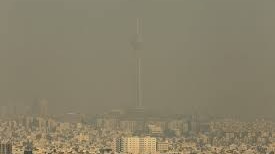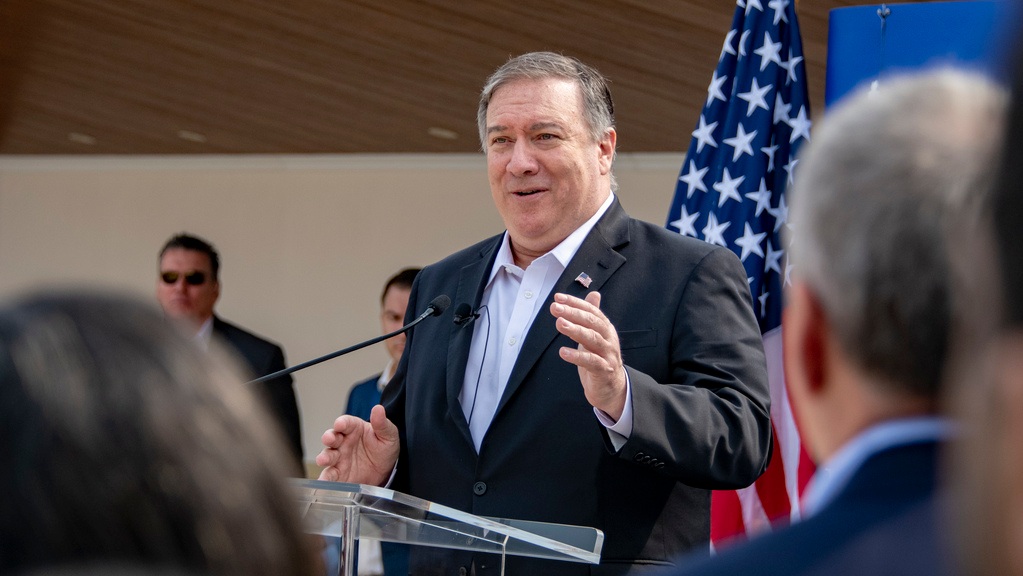Iran Digest Week of April 26-May 3
/Iran Digest Week of April 26-May 3
AIC’s Iran digest project covers the latest developments and news stories published in Iranian and international media outlets. This weekly digest is compiled by Research Associate Michel Gomes and Communications Associate Shahab Moghadam. Please note that the news and views expressed in the articles below do not necessarily reflect those of AIC.
US-Iran Relations
After Oil, Washington Weighs Sanctions on Iran’s Other Sources of U.S. Dollars
The Trump administration is considering a more-aggressive enforcement of its economic sanctions on Iran—targeting more companies and financial institutions that do business with the Islamic Republic in an attempt to cut off lucrative sources of U.S. dollar-denominated hard currency, U.S. officials said.
The new sanctions on banks and businesses would be aimed at choking off trade including Iran’s petrochemical sales to Singapore and its consumer-goods sales to Afghanistan.
The prospect of added pressure on Iran comes as Washington kicked off a fresh round of sanctions on Iranian oil exports on Thursday. The U.S. ban is aimed at coercing Iran into reaching a new nuclear and security pact. In targeting the country’s crude—its main income source—the U.S. hopes to sever the financial and trade ties that are keeping Iran’s economy afloat. (WSJ)
Nuclear Accord
Iran intensifies nuclear diplomacy but says patience 'running thin'
As part of a reshuffle inside Iran's Foreign Ministry, veteran diplomat Bahram Ghassemi was recently appointed as the country's new ambassador to France. Ghassemi's mission is said to be focused on reinvigorating international diplomacy to save the Joint Comprehensive Plan of Action (JCPOA), a deal that has been shaky ever since US President Donald Trump pulled the United States out of it last May.
The new ambassador is now hectically tapping on Europeans to speed up practical measures they have promised. Ghassemi sat down with French Foreign Ministry Secretary-General Maurice Gourdault-Montagne in Paris. Gourdault-Montagne is a member of the supervisory board of the Instrument in Support of Trade Exchanges (ISTEX), a trade mechanism launched in January by the European signatories of the JCPOA as a means to facilitate lawful trade and shield it against US sanctions. The official Twitter account of the Iranian Embassy in France described the meeting as "very constructive and positive." (Al-Monitor)
Environment
Sanctioning Iran's Climate
Emblazoned across the jerseys of Iran's 2014 World Cup soccer team is a symbol of national pride: the endangered Asiatic cheetah. Iranian conservationists have worked for years to reverse the cat's dwindling population, and sadly their critical efforts are hampered by forces both in and outside of Iran. The world celebrated Earth Day on April 22, 2019 with its theme Protect Our Species; a reminder of the devastating impacts of climate change for species unable to adapt.
Iran's climate change struggles are nothing new. Eager to develop infrastructure and technology as a way of catalyzing immediate economic benefits, the government paid little attention to long-term environmental impacts. Domestically, the Iranian government is failing to tackle this challenge and instead persecutes environmental conservations, which serves to further damage the environmental movement. On an international scale, additional US sanctions also continue to hamper Iranian efforts to combat current and future effects of climate change. (The Atlantic Council)
Economy
IMF: US Sanctions Cutting Iranian Growth, Boosting Inflation
The International Monetary Fund is forecasting Iran's economy to shrink by 6% this year as it faces pressure from U.S. sanctions.
In a report released Monday, the IMF said its estimates for Iran, which include the potential for inflation to top 40%, predate a U.S. decision to end waivers that have allowed some Iranian oil buyers to continue making their purchases despite new sanctions that went into effect last year.
The Trump administration is due to formally end the waivers on Thursday for some of Iran's top crude purchasers, including China, India, Japan, Turkey and South Korea. (VOA News)
Inside Iran
Iran arrests dozens at International Workers’ Day protests
Iranian authorities violently dispersed gatherings of independent Iranian labor organizations and arrested dozens of activists who were protesting in association with International Workers’ Day (May Day).
According to the labor organizations involved, dozens of people have been arrested so far. Protesters gathered May 1 in front of Iran’s parliament building, where a number of well-known protesters — including Reza Shahabi, Kayvan Samimi, Hassan Saedi, Vahid Fereydouni and Mohammad Ali Eslaghi — were arrested. Teachers, retirees and students also joined the protests.
According to fliers calling for the protests, some of the issues were “instability in the labor force, low and delayed wages, privatization, unsuccessful businesses, and pressure on independent unions and activists.” A previous labor protest April 26 in Tehran was also violently dispersed by security forces and led to the arrests of activists and organizers. While most of the individuals who were arrested from that protest were released the same day, three individuals remain in custody. (Al-Monitor)
Iran TV pulls game shows amid religious gambling row
Iranian state TV has temporarily banned the country's equivalent of Who Wants to a Millionaire after complaints by senior clerics and conservatives.
Supreme Leader Ayatollah Ali Khamenei warned that game-shows endanger the "culture of hard work and productivity" that the country seeks to encourage.
Now a senior Shia cleric has issued a fatwa (an Islamic religious ruling) against shows like Be a Winner that offer cash prizes.
Gambling is banned under Islamic law. (BBC News)
Regional Politics
Iran Wants 'Good' Relations With Saudi Arabia, UAE
Iran said Wednesday it hopes to have good relations with arch-rival Saudi Arabia and its allies, and called for an end to their bitter dispute with Gulf neighbour Qatar.
Riyadh broke off relations with Tehran in 2016 after protesters angry at its execution of a top Shiite cleric torched its diplomatic missions in Iran.
The following year the kingdom and its allies Bahrain and the United Arab Emirates imposed a trade and travel boycott on Qatar, demanding that it mirror their hardline policies towards Iran and the Muslim Brotherhood.
"We have extremely good relations with Qatar, Kuwait, Oman," Iranian Foreign Minister Mohammad Javad Zarif said, referring to the two Gulf Arab countries which remained neutral in the dispute. (VOA News)
UN Rights Chief 'Appalled' By Iran's Latest Execution Of Minors
UN High Commissioner for Human Rights Michelle Bachelet has condemned the recent execution of two 17-year-old boys in Iran as "deplorable."
Mehdi Sohrabifar and Amin Sedaghat were executed on April 25 at the Adelabad prison in Shiraz, the capital of the southern Fars Province. The two had been arrested at age 15 and convicted on multiple rape charges after what international rights groups said was an unfair trial.
"I am appalled," Bachelet said in a statement on May 3, urging Tehran to immediately halt all executions of people accused of committing crimes while children.
"The prohibition of executions of child offenders is absolute under the International Covenant on Civil and Political Rights and under the Convention on the Rights of the Child," she said. (Radio Farda)
Pakistan steps up efforts to soothe Iran
Seeking to reset bilateral ties, Pakistani Prime Minister Imran Khan traveled to Tehran recently, making his first visit there since assuming office in August.
In February, a suicide attack killed 27 Iranian soldiers near the border, and just before Khan arrived in Tehran, a lethal attack took place at Ormara in Pakistan’s Baluchistan province, targeting Pakistani soldiers and members of the naval coast guard.
Suspecting a foreign hand behind the terror attacks, Khan shared his concerns during a joint press conference April 22 with President Hassan Rouhani, saying, "The most important reason why I'm here, Mr. President, is because I felt that the issue of terrorism was going to … increase differences between our countries.” Both leaders agreed to take stringent security measures to deal with the wave of terrorism in recent months. (Al-Monitor)
Analysis
Renewing Waivers For Nuclear Projects With Iran Serves U.S. Interests
By: Kelsey Davenport
A critical decision in the long-running effort to block Iran’s potential path to nuclear weapons is just days away. The Trump administration must decide by May 2 to renew sanctions waivers allowing required nuclear cooperation projects with Iran detailed in the 2015 multilateral nuclear deal to continue or let the waivers lapse. Failure to grant the waivers would jeopardize U.S. nonproliferation priorities and increase the risk that the nuclear deal, known as the Joint Comprehensive Plan of Action (JCPOA), will collapse. Tehran is already threatening to withdraw from the JCPOA and, more seriously, the 1968 nuclear Nonproliferation Treaty (NPT) after the United States announced April 22 that it would no longer grant waivers to states seeking to purchase Iranian oil.
When the Trump administration first issued the 180-day nuclear cooperation waivers November 5, it stated that allowing these projects to go forward would “impede Iran’s ability to reconstitute its weapons program and lock in the nuclear status quo until we can secure a stronger deal”—a clear acknowledgement that the U.S. benefits from these crucial nonproliferation projects. (LobeLog)











